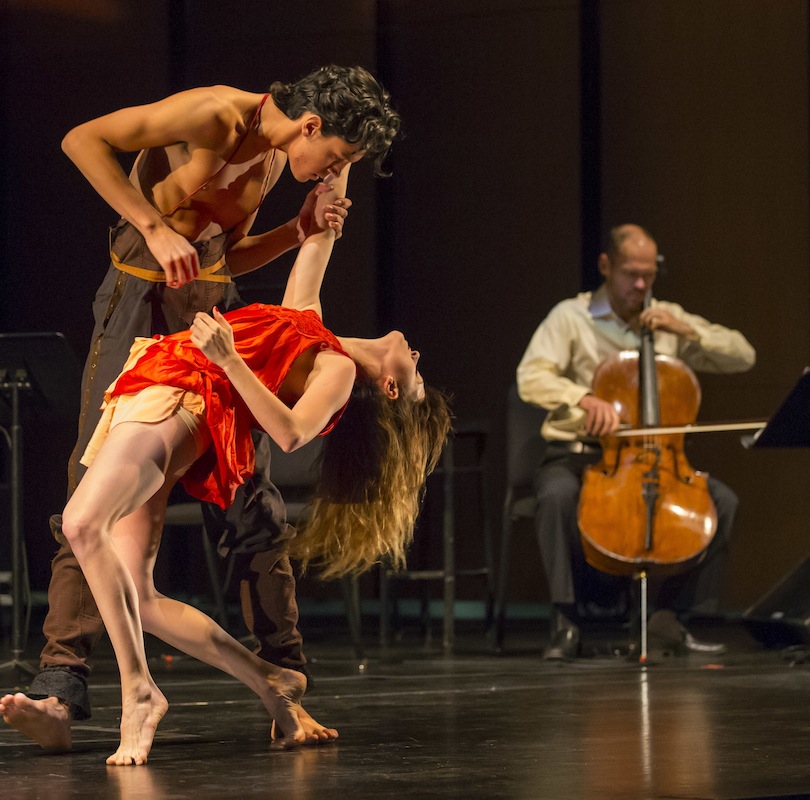MusicNOW wraps season with extreme contrasts and “savage” fury

With the divers sonic assaults on contemporary ears and sensibilities, it’s not easy to provoke today’s audience members to walk out of a performance. Yet Monday night at the Harris Theater Oscar Bettison’s grinding and harshly dissonant Livre des Sauvages did just that—an accomplishments of sorts, especially for a new-music series.
Bettison’s jarring work capped the final concert of MusicNOW’s season Monday, which offered one of the most consistent recent programs in the Chicago Symphony Orchestra’s new-music series.
If Bettison’s work brought the noise and dissonance, Andrew Norman’s music, which opened the evening, offered the polar opposite. The Companion Guide to Rome is cast in nine brief movements, each a portrait of an individual Roman church, which, in Norman’s fanciful view, morph into imaginary companions.
Six of the nine brief movements (Nos. 1, 3, 4, 5, 6 and 9) were performed Monday. Scored for unplugged violin, viola and cello, the music uses different combinations and occasional solos for the three players. The music alternates between driving energy and gradations of hushed dynamics—as in No. 2 wherein violist Weijing Wang stands apart from the others, playing plucked and bowed notes that hover on the edge of audibility.
Norman’s tendrils of extreme low dynamics threaten to become a mannerism after awhile, but the young composer does succeed in drawing some striking effects and rarefied hues, as with No. 6, which sounds a muezzein-like call to prayer. The final section culminates in a welter of contrapuntal string lines like a sunburst of Renaissance polyphony evoking Rome’s ancient past. Violinist Baird Dodge, violist Wang and cellist Joshua Zajac performed with strength, delicacy and a remarkable array of nuanced dynamics.
Anna Clyne’s Fits + Starts is a concise early work (2003) from the CSO’s co-composer-in-residence. Originally written for two dancers and tape, Clyne later added a live component for amplified cello.
Dancers Sara Silken and Christian Brower handled the jagged movements of Kitty McNamee’s choreography deftly though the Terpsichorean element proved less interesting than the music itself. Fits + Starts is another Clyne winner—distinctive and bracingly modern yet with elements that seem to conjure up the distant musical past.
As always Clyne packs a lot into a short (6 minutes) duration. Sharply rhythmic music for the live and pretaped cello mingle with a jangly harpsichord and other electronic sounds, the work coalescing in a soaring lyrical melody for cello that provides a sense of culmination without over-sugaring the soup. Cellist Brant Taylor provided stellar advocacy, enough to make one think the brief movement could form the basis for a larger solo work for cello and tape.
Born in England and long resident in the U.S., Oscar Bettison based his Livre des Sauvages (Book of the Savages) on the mysterious eponymous tome, a work of bizarre childlike yet sexually explicit doodles. The drawings were once thought to have come from Native American origins though the German language elements clearly refute that.
In his video program note, Bettison said that the music is not directly programmatic—how could it be?—but inspired more by the strange and unsettling nature of the images. Bettison’s work is set on a large scale, cast in three movements spanning a half-hour, and scored for dueling ensembles of mixed strings and winds with a percussionist situated in between the two groups at the back.
The first section is all driving rock-edged riffs with fitful beast-like lowing from the horn. The second section is a kind of contemporary night music, conjuring weird unearthly sounds—not least the two violin leaders each foot-pumping a device that contributes malign organ-like chords like something out of Hammer Films. The finale is a wild ride, with squealing high winds and aggressive asymmetric rhythms, neither exciting nor outwardly virtuosic, but more dogged and gnarly in its raw dissonant insistence, rising to moments of violent primal fury.
Conductor Cliff Colnot’s skillful direction kept this complex heavy-metal score on track and all of the assembled forces contributed to deliver a powerful performance, not least percussionist Cynthia Yeh.
Posted in Performances
